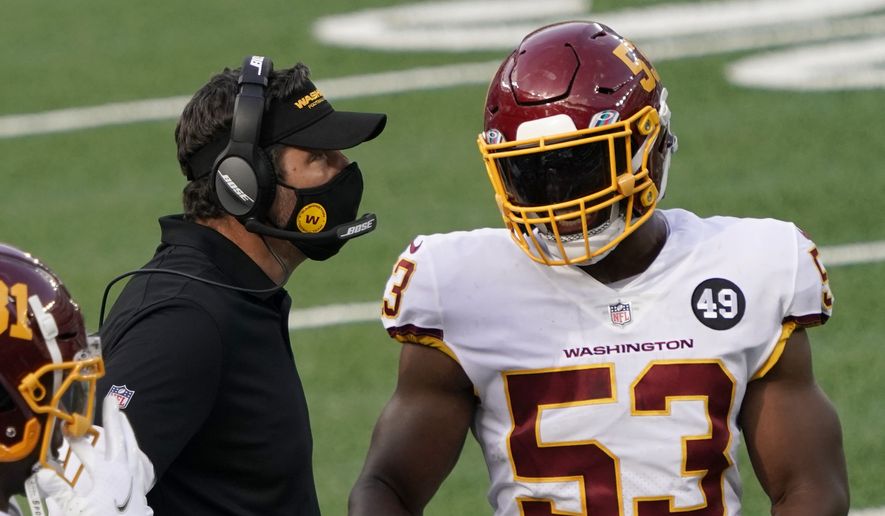Listen to local sports talk radio these days and it won’t be long before the subject switches to Ron Rivera’s handling of the Washington Football Team. Over the first month of the season, radio hosts and fans have criticized the coach for what they see as his mixed messages.
Rivera’s contradictions, critics contend, have created confusion.
The coach says he wants to win — only to wave a white flag at the end of games by not calling timeouts. He talks about long-term development, all while benching Dwayne Haskins four games into the season. Rivera admits to chasing the short term, but then doesn’t put Kyle Allen — his starter who was cleared to return from an injury — back in for the second half of a loss to the Los Angeles Rams.
So on Monday, less than 24 hours after Washington fell to the bottom of the NFC East with a 20-19 loss to the New York Giants, Rivera was asked about the topic that had filled hours upon hours over the airwaves.
Is he sending contradictory signals to his players?
“No,” Rivera said, “I think my message has been consistent.”
As his team looks to rebound from its fifth straight loss, Rivera defended his approach for his first season with Washington.
The 58-year-old said he believes in creating a winning atmosphere.
It’s why he hasn’t shied away from openly talking about winning the division. Even after falling to the previously winless Giants, Rivera said his team will continue to chase the NFC East crown because “the division isn’t very good right now.”
In that sense, Rivera is right. The Philadelphia Eagles fell again Sunday, dropping to 1-4-1. The Giants are 1-5, just like Washington. Depending on the result of their Monday night game against the Arizona Cardinals, the Dallas Cowboys will either be 2-4 or 3-3. Washington faces Dallas on Sunday and then New York again on Nov. 8.
Rivera is trying to have it both ways — building for the long haul while also capitalizing on the opportunity in front of the team.
“It’s just a matter of us settling in and learning how to win,” Rivera said. “That’s the thing I’ve constantly got to talk to them about is that you’ve got to come in, you’ve got to practice hard, you’ve got to work hard, you’ve got to develop. The thing I like is that we have a lot of young guys that are playing right now. This is their opportunity to learn and grow together.”
Rivera’s “learning how to win” philosophy was laid bare in Sunday’s loss. With 36 seconds left, Rivera passed up a game-tying extra point after a touchdown to go for the two-point conversion in an attempt to win. He justified the play, which ended in an incompletion, by telling his players he was there to win. “The only way to learn how to win is to play to win,” he said.
Even that explanation, though, got complicated.
Rivera also said he went for two because he believes overtime favors the home team. And on Monday, he confirmed that if the stadium had been different — if Washington had hosted New York at FedEx Field — he would have kicked the extra point in that situation.
His explanation, though, seemed to fuel more questions: If Rivera wants his team to learn how to win, then why would that change at home? Why would overtime be advantageous to the home team in a season in which fans aren’t permitted at most stadiums due to the coronavirus? (They weren’t allowed at MetLife Stadium on Sunday.)
Rivera said he didn’t think about the lack of fans when he went for two. He later indicated that “statistics tell us” that home teams are more likely to win in overtime. Rivera did not cite a specific stat, but according to Pro Football Reference, home teams are 79-37-9 in regular-season overtime games since 2012.
Despite the confusion at times, players have described Rivera as a straight shooter. Tackle Morgan Moses praised Rivera for how he handled benching Haskins, saying it was a “breath of fresh air” to have the coach give them the news directly.
“You respect that person because instead of having somebody else tell you, he’s in there telling you to your face,” Moses said.
On Monday, Rivera said there were players up and down Washington’s roster who have what he described as a winning mentality. He pointed to the way Brandon Scherff finished blocks. He noted how players like Jonathan Allen come from programs like Alabama, where winning is ingrained on a daily basis.
Others are still learning that mindset, though.
Asked for his definition of a successful first season, Rivera’s two-fold answer reflected the two potentially conflicting goals the coach has set for himself and the Washington Football Team: Winning as many games as possible while overhauling the dysfunctional culture that has plagued the franchise for years.
“The second thing is that these guys can step away and say: ‘Wow, this is the culture that we’re going to have. This is the way that we’re going to do things. This is the way that we need to do things. This is our way,’” Rivera said. “That, to me, is important.”
In one answer, Rivera straddled between the present and the future. Just as he has all season.
• Matthew Paras can be reached at mparas@washingtontimes.com.




Please read our comment policy before commenting.